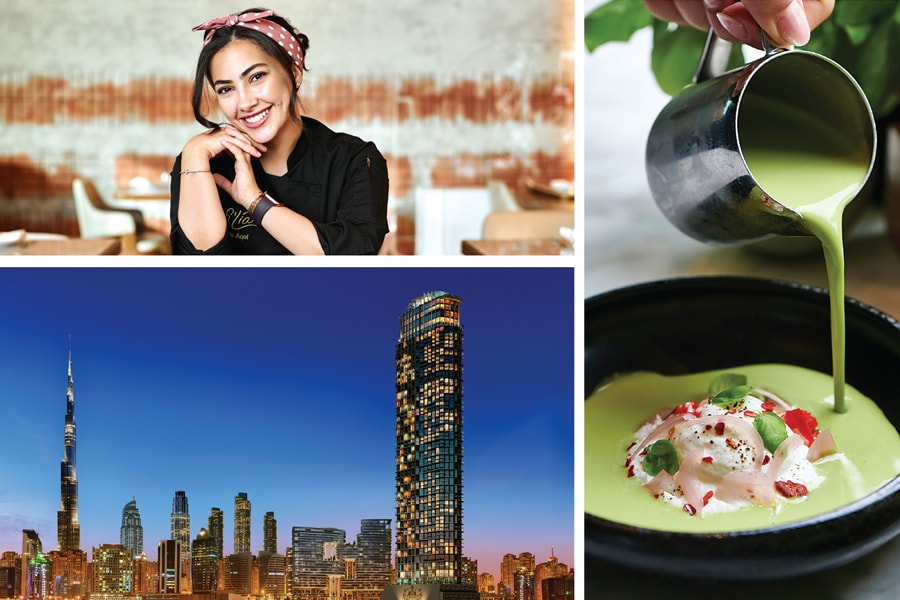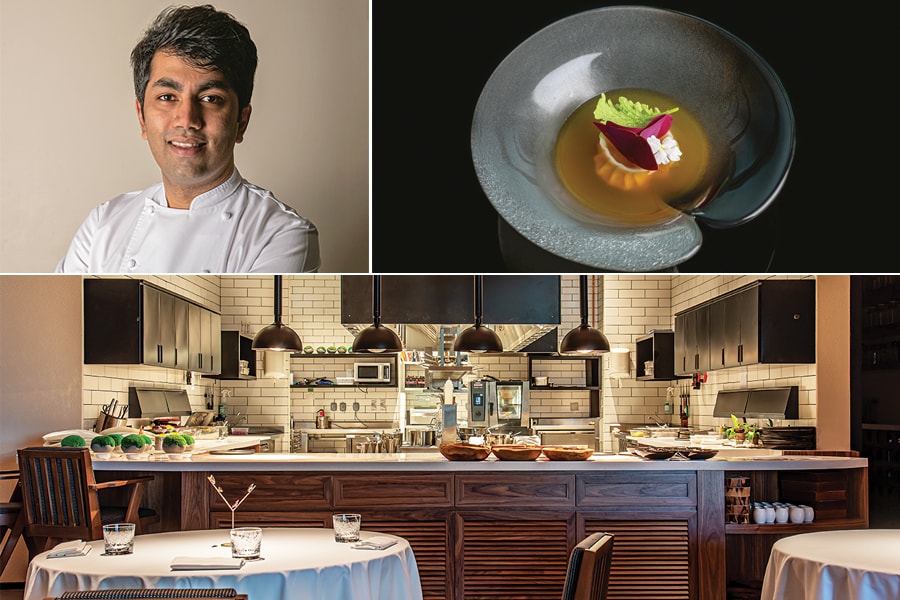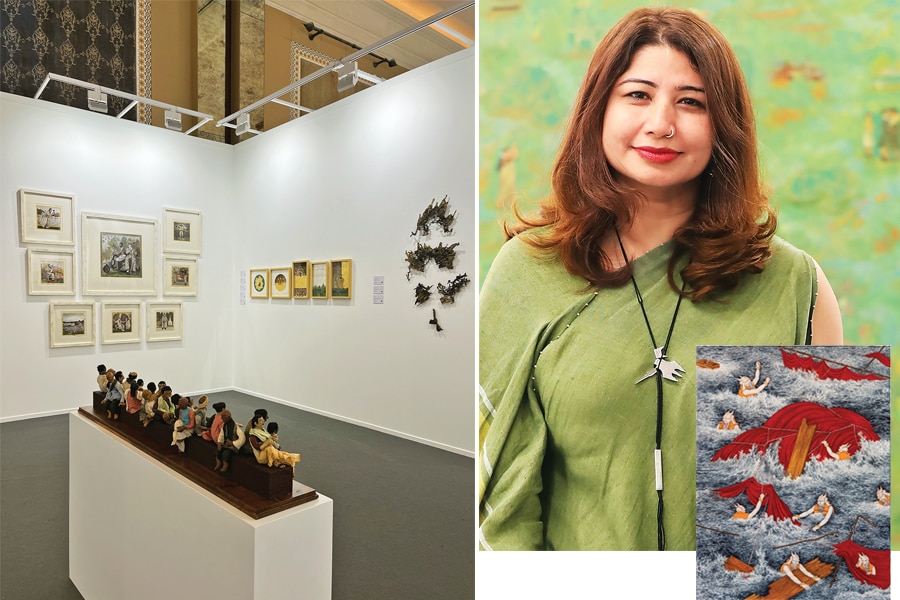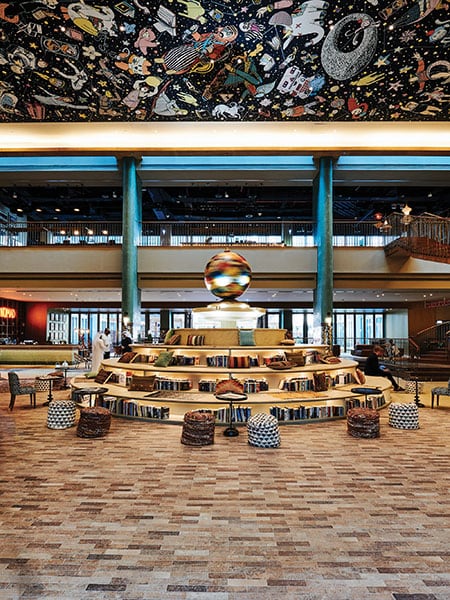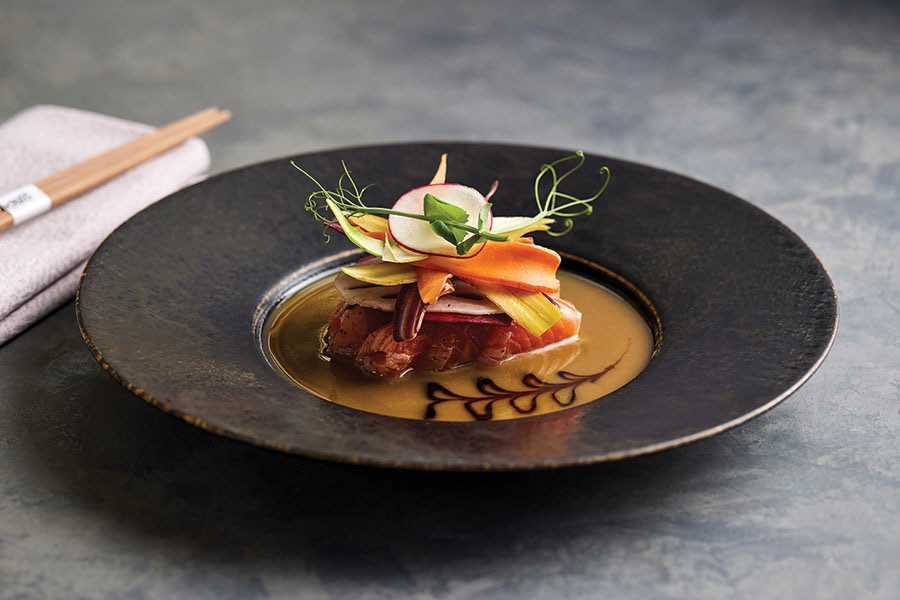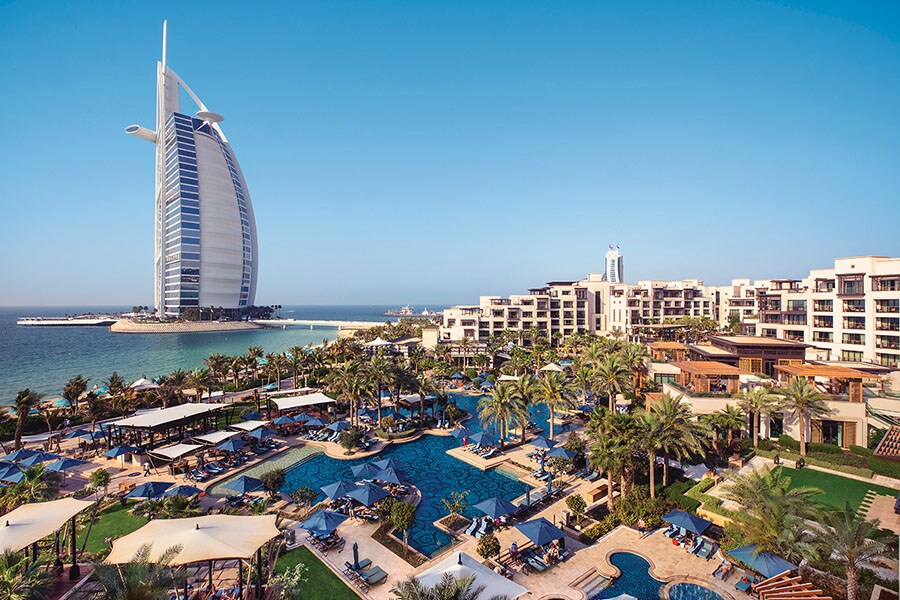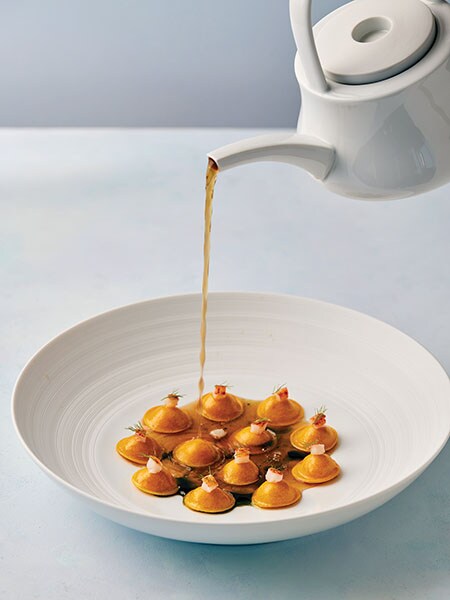For one, it’s a pizza oven (albeit state-of-the-art) that occupies pride of place in the restaurant. For another, the idea is to bowl you over with real food—Italian meets Arab—not spectacle.
In the land of Zumaesque restaurants, Fi’lia is one of those surprisingly trendy offerings that are playing up by dialling down in Dubai. It has just bagged a Bib Gourmand listing by the Michelin Guide, which debuted in Dubai in June. But Fi’lia, which means daughter in Italian, has been grabbing attention since it opened in mid-2021, as the Middle East’s first restaurant with an all-woman team in leadership roles.
Helmed by Palestinian-Jordanian executive chef Sara Aquel, 26, it front-foots gender parity in a region of stereotypes, but serves up more than political correctness. The menu is hearty-yet-innovative: Burrata Popolare (a take on a Massimo Bottura recipe), Feta al forno, pizza, gnocchi with caviar et al. Everything is made with vegetables, fruit and cheese sourced from local Emirati producers, in sync with global trends around local gastronomy, something Dubai, the land of foreign brands, was not big on at least till 2020.
Two years post that watershed moment, the idea of luxury in the city may be changing, as restaurants such as Fi’lia demonstrate, as also the emergence of a new pop culture driven by affluent pandemic tourists as well as immigrants in creative businesses who have settled down here since 2020, attracted by easy visas, safety, one of the most successful vaccination programmes in the world, and the fact that in the post-pandemic world, hybrid working is a given.
As one of the first regions to open up after the first lockdown, Dubai in 2020-2021 found itself described as the “new Casablanca", a safe zone to which billionaires, financiers and the arty cosmopolitan elite from Western Europe, Russia, Hong Kong, California and India flocked.
In September last year, Forbes ran a report on: ‘Why the world’s wealthy have quietly moved to Dubai’, estimating that 20 billionaires had bought property in Dubai that year, and pointing out that villa and luxury property sales were up by 120 to 130 percent over the year before. “A giant cryptocurrency conference in October (2021) drew dozens of young millionaires who paid cash upfront for beach villas", the Associated Press quoted real estate agents as saying.
These consumers with global lifestyles and cosmopolitan tastes are now ushering in new chic. As artists, financiers, chefs, mavericks and creators congregate, Dubai is reinventing itself from bling to cool.
![]() (Clockwise from right) Sara Aquel, executive chef of Fi’lia at the SLS Hotel, which bagged a Bib Gourmand listing by the Michelin Guide creamy burrata heart with basil oil a view of the SLS Hotel, one of Dubai’s newest and tallest skyscrapers the Saturday brunch on Filia’s iconic terrace on the 70th floorImage: Courtesy SLS
(Clockwise from right) Sara Aquel, executive chef of Fi’lia at the SLS Hotel, which bagged a Bib Gourmand listing by the Michelin Guide creamy burrata heart with basil oil a view of the SLS Hotel, one of Dubai’s newest and tallest skyscrapers the Saturday brunch on Filia’s iconic terrace on the 70th floorImage: Courtesy SLS
From Flash to Fresh
“Everything in Dubai earlier was about tallest, biggest, record-breaking, but with the pandemic, that has changed dramatically. Instead of only the big commercial projects, there are now restaurants doing chef’s tables, omakase menus, smaller restaurants and even those like Orfali Bros (one of the trendiest bistros, which debuted as No 5 on the 50 Best list for the MENA region this year, run by three Syrian brothers, telling the story of their family through food in Jumeirah) which do not even serve alcohol," points out chef Himanshu Saini of Tresind, the path-breaking Indian restaurant in Dubai that had opened in 2014.
Saini opened the Tresind Studio annexed to the original restaurant, offering a more elevated experience with fewer covers, and says that since the pandemic, this format which is more immersive and focuses more on spicing and the detailed nuances of Indian food instead of international techniques used to cook “modern Indian" has been doing really well.
“Thankfully, we didn’t really feel the pandemic and were able to evolve because of the sheer number of top chefs who came to Dubai for the expo and while other countries were closed. Interacting with them changed my way of thinking," Saini confesses, even as he adds that these top global chefs who had earlier seen Dubai only as a money-making destination for the offshoots of their established brands are now seeing the city differently. “With more creative professionals here, tastes have changed and people are looking to do really cutting-edge work for acclaim," he points out.
![]() (Clockwise from above, left) Chef Himanshu Saini ‘Splendours of South’ with lobster tail and rasam a view of Tresind Studio, an annexe of the path-breaking Indian restaurant Tresind that opened in 2014
(Clockwise from above, left) Chef Himanshu Saini ‘Splendours of South’ with lobster tail and rasam a view of Tresind Studio, an annexe of the path-breaking Indian restaurant Tresind that opened in 2014
Originality on the menu
Shedding its image of London or New York’s poor cousin, gastronomy in Dubai is buzzing and not merely because it is easier to get reservations to one of the offshoots of a 50 Best restaurant.
Instead, original ideas are rolling in thick and fast. One of the recent big openings in Dubai is Massimo Bottura’s Torno Subito (translated to ‘be right back’), a relaxed 1960s, La Dolce Vita-referencing beach club with the precise, sophisticated cooking the exacting Bottura is known for. There’s a classic Margherita pizza (for roughly $21) but also a Beautiful Psychedelic Veal, inspired by a Damien Hirst painting.
But Torno Subito is no Osteria Francescana (Bottura’s 3 Michelin Star restaurant in Modena) or its offshoot. Instead, it is a concept created specifically for Dubai by the chef who chose to open in Dubai as his first venture outside Italy.
Then, there are rising stars like chef Solemann Haddad of Moonrise, born to a French mother and Syrian father, self-taught, who does Japanese omakase with local Middle Eastern ingredients, pushing boundaries in an eight-seater on a rooftop on Sheikh Zayed Road. There are just two seatings per evening, and since it is now thought of as a “must do" in Dubai, reservations are tough.
Meanwhile, with sustainability in focus in the post-pandemic world, restaurants like Lowe, that got the only “green star" from the Michelin guide in the region, are championing nose-to-tail cooking, zero waste and local ingredients. Luxury is not always ostentation, even in Dubai.
![]() (Clockwise from above, left) Art Dubai opened in March and sold more artworks to Indians who had settled in Dubai recently Bhavna Kakkar of the Delhi NCR-based Latitude 28 Khadim Ali’s Untitled, a work in gouache and gold leaf on Wasli paper
(Clockwise from above, left) Art Dubai opened in March and sold more artworks to Indians who had settled in Dubai recently Bhavna Kakkar of the Delhi NCR-based Latitude 28 Khadim Ali’s Untitled, a work in gouache and gold leaf on Wasli paper
Indians as tastemakers
It’s not just food but everything from art, fashion and luxury hotels that are being consumed in different ways from pre-2020 when “more was more". What’s more, as the idea of luxury changes, Indians, particularly those who moved in from Hong Kong, Singapore, California or London, are part of the in-crowd.
“When we participated in Art Dubai [modelled after the fair in Basel] in March, I sold more works to Indians who have settled recently, and who are doing up their new homes, than to local Emiratis or Westerners, who were the primary market for galleries such as ours focussed on Indian contemporary art earlier," says Bhavna Kakkar of the NCR-based Latitude 28.
Kakkar speaks about a new, informal club of Indian investors interested in art, based out of Dubai, who travel together visiting exhibitions and attending fairs globally. “The two years of the pandemic where everyone was active on social media has created awareness and interest," she says.
Along with Dubai, Abu Dhabi and Sharjah have been promoting art for a while now. Post-pandemic, these previous efforts to develop a ‘Middle East circuit’ that is ‘serious’ seems to be bearing fruit. “With government backing, even the valuation of artists from the Middle East is going up," says Kakkar.
The ‘arty lifestyle’ and its profusion can be seen all over in boutiques, bespoke design, cutting-edge cafes and hotels that are unique and not merely flashier than the rest of the world.
![]() The lobby of LGBTQ-friendly design hotel 25hours features a lobby with a fountain and co-working space
The lobby of LGBTQ-friendly design hotel 25hours features a lobby with a fountain and co-working space
More is no more
When it comes to luxurious hotels, Dubai is no stranger to frills and thrills: Everything from underwater suites to those equipped with helipads or private drive-ins, caviar bars, beach clubs and glitzy skyscrapers.
However, in the last two years, the ideas of ‘bespoke’ and ‘boutique’ have taken root and luxury hotels are now championing experiences around inclusiveness, local cultures, conservation and other values of the new global order.
While big will always be in (the biggest newsmaker recently is a lavish plan to make “moon hotels"—gigantic, dome-like hotels resembling the moon, complete with realistic craters and textures, possibly towering 735 feet high, with a 2,000 foot circumference, as CNN reported), design hotels built to suit the global pop culture, including Instagram-led, and woke, are trending.
![]() Salmon Tataki and Karashi-Su Sauce at Kayto
Salmon Tataki and Karashi-Su Sauce at Kayto
The hotel 25hours, which opened in December 2021, is an example. A European brand of design hotels “inspired by the spirit of our times… democratic, tolerant and welcomes anyone with a sense of curiosity", according to its website, it is known as LGBTQ-friendly (and awarded as such) outpost in cities like Cologne.
In Dubai, the hotel is more luxurious, but the vibe is just as inclusive and cutting-edge. It mixes the retro with the modern: Rotary phones with podcast recording rooms, pottery studio and the first mixed-gender sauna in the region.
The rooms are designed for “urban nomads" with themes such as Glamping, Farmstay, and Artists Village, and come with complimentary Schindelhauer bikes, easels, swings, not to mention books (10,000 of them, as part of a fountain that dominates the lobby). The lobby takes the shape of a co-working space suitable for freelancers or artists and maverick bankers comfortable in the era of hotdesking.
![]() The Al Naseem resort by the Jumeirah group
The Al Naseem resort by the Jumeirah group
Emirati luxe goes global
The gold standard for luxury in Dubai is, of course, the Jumeirah Group, with the pinnacle being the Burj al Arab as well as the Madinat, its Arabian Gulf-facing resort with four hotels, a slew of international restaurants and a charming boat to ferry you from point to point via waterways that are all part of a single complex.
The Group is now reworking itself as the only Emirati luxury hospitality brand going global, with new openings in the Maldives, and Europe, as well as the acquisition in London of the Carlton Tower in Knightsbridge that reopened last summer after a £100 million refurbishment!
Part of the strategy is to raise the bar on dining experiences at all the hotels and attract travellers who gravitate towards luxury food and beverage as well as “experiences", rather than merely brick and stone.
Recent upgrades in engaging new chefs for marquee restaurants such as the Al Muntah at the Burj Al Arab have paid off and the restaurant (French with Mediterranean influences) led by former Arpege Paris chef Saverio Sbaragli has just won a Michelin Star.
At the Al Naseem, one of the group’s minimalist design hotels, the restaurant Kayto, serving Peruvian-Japanese food, is a big success, since becoming the first luxury restaurant to open in Dubai in 2020 when restrictions eased.
![]() Bottoni Lobster at Al Muntaha
Bottoni Lobster at Al Muntaha
“Dubai is not just about luxury shopping… we are actively looking at the HNI market in India that will come here for more reasons and also get acquainted with our brand of Emirati hospitality where we go into customised detailing," says Miet Saelens, head of global corporate communications for the group, as we sit chatting over perfectly poured pisco sours and the daintiest Waghyu tacos I have encountered.
With the high-spending Indians with a taste for global luxury a target market, the focus is also on Indian gastronomy.
“Do you think we can get Manish Mehrotra here [to Dubai] at least for a pop up? Or we can bring in a top Indian chef to set up a restaurant," Saelens muses, tossing ideas at me, recounting a dinner she had with Delhi’s “society" in attendance at the Indian Accent on a recent India visit.
In the post-pandemic world, luxury is unique experiences, and both India and Dubai are at its forefront.

